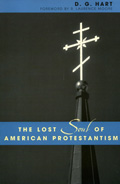
D. G. Hart
Reviewed by: David Holmlund
The Lost Soul of American Protestantism, by D. G. Hart. Published by Rowman & Littlefield, 2004 (new edition). Paperback, 232 pages, list price $24.95 (hardback, $39.95). Reviewed by OP pastor David Holmlund.
Is the Orthodox Presbyterian Church an "evangelical" denomination? We've all heard that question, and while most of us in the OPC would like to answer this in the affirmative, so as not to give the impression that we are theologically liberal, most of us also realize that it is misleading in some ways to say that the OPC is "evangelical" without any additional qualification. Why is that?
A recent book by D. G. Hart (who, in addition to being an accomplished historian, is also an elder at Calvary OPC in Glenside, Pennsylvania) offers an answer to that question which will satisfy some people and (no doubt) frustrate others. In The Lost Soul of American Protestantism, Hart argues that the usual identification of the two streams of American Protestantism: as "liberal" and "evangelical" has greatly obscured the character of the churches that have historic roots in the Reformation and seek to be biblically faithful (i.e., theologically conservative) today. This has happened because the evangelical movement has defined itself in terms of personal conversion, not in terms of the characteristics that mattered most to the earliest generations of Protestants and still matter to those seeking to follow in their footsteps (Orthodox Presbyterians, for example).
As the author observes, each of the major Protestant traditions (Baptist, Episcopalian, Lutheran, Presbyterian, Dutch Reformed, etc.) formed with three characteristics in mind: theology/creed, worship/liturgy, and church government/polity. Hart argues that these remain the most natural categories to use in evaluating fidelity to the traditional forms of Protestantism. Those who maintain all of these distinctives he calls "confessionalists," and those who abandon them in order to embrace the subjective conventions of American revivalism he calls "pietists." The greater part of the book is devoted to arguing that this taxonomy does substantially better in parsing the experience of American Protestantism than the old labels (liberalism vs. evangelicalism/fundamentalism). He devotes separate chapters to significant moments in the American experience of Presbyterians, the Dutch Reformed; and then Lutherans that attest to this.
But the payoff of this study is not just for historians. Hart also argues that the three main concerns of the confessionalists must inform contemporary practice if we are to maintain the spiritual vitality of our religious heritage. The loss of distinctive creed, liturgy, and polity is ultimately the loss of the soul of the great Protestant traditions, and the truncated concerns of the evangelical community will do little to revive them.
This project is ambitious, but purists will decry the bleeding over of historical research into contemporary controversies and vice versa. The greatest offense will be taken, no doubt, by those who reject traditional creedal theology, liturgical structure, or ecclesiological patterns, but do not like being labeled "pietists" or being grouped with those also found to be lacking in confessionalist hallmarks.
However, the strength of the book is the superbly researched recovery of several categories that are deeply embedded in the traditions of Protestantism, "confessionalism" being at the top of the list. Moreover, the applications of Hart's thesis extend to a number of very important issues. Some of these issues are more controversial (like worship or social activism), while others are less controversial (such as the nurture of Christian faith in children and the church's posture toward secularism). But even if some of the issues are less controversial, they are still equally foundational. Church officers and laypersons alike will greatly benefit from this book, and the OPC will be a more self-consciously Reformed body for having considered Dr. Hart's interpretation of American Protestantism.
November 17, 2024
November 10, 2024
Taming the Fingers: Heavenly Wisdom for Social Media
November 03, 2024
Unfolding Redemption: Exploring the History and Order of Salvation
October 27, 2024
You Are Still a Mother: Hope for Women Grieving a Stillbirth or Miscarriage
October 06, 2024
September 29, 2024
September 22, 2024
Christianity and New Religious Movements: An Introduction to the World’s Newest Faiths
© 2024 The Orthodox Presbyterian Church